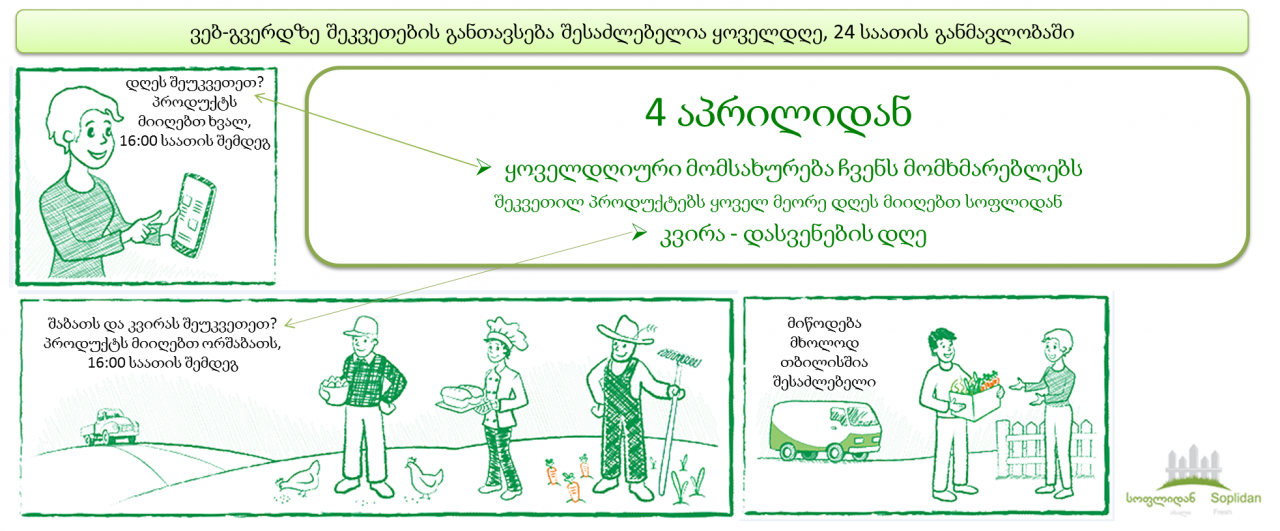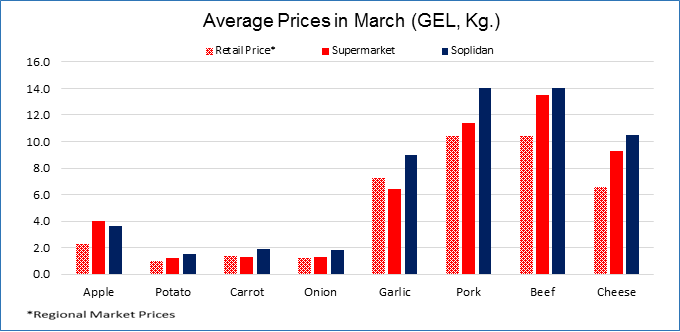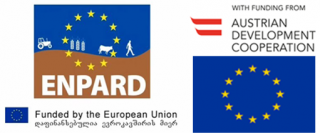Have you ever had a problem of buying healthy products or being lazy to go shopping in open air bazaar? Wouldn’t it be wonderful to be able to order natural and fresh food that gets delivered straight to your door that is not of the fast-food, take-away variety? There might just be reason for optimism with the story of soplidan.ge (“from the village”).
This is a story of a small-business with an innovative idea. Soplidan is the first Georgian internet portal to offer online shopping for agricultural products. Consumers can choose goods they want to buy and it will take one day to reach the buyer. It offers a great way to get fresh, healthy, natural fruit and vegetables delivered straight to your door. Indeed, “Soplidan” was named as the best startup of 2015.
Two young ladies are behind this beautiful business idea. Nino Mgebrishvili and Natia Ninikelashvili from the Kakheti region have been friends for 10 years. As young mothers, both Nino and Natia faced the common challenge of shopping for healthy food products for their children. To find natural and healthy products they often had to travel to different villages or bazars—a time consuming exercise. They soon realized that not everyone has the opportunity to travel for a couple of hours and buy products from villages. They thought that if people can shop and buy clothes online, then why not to do the same for agricultural products? Thus their business idea was born.
Nino and Natia started with market and price research. They had contacts in various Kakhetian villages and could easily buy local products from different small and family farmers. They then registered soplidan.ge, created a very beautiful website for online shopping, and organized a delivery system that would bring orders directly to customers.
Understanding how important the appearance of their products is to consumers, Nino and Natia ensure that everything is washed, packed and branded properly. This gives them a distinct advantage over the option of bazar shopping, where there is a very little assurance as to the quality and origin of most food items. Despite this, the prices offered on soplidan.ge are not very different from those found in the bazars. This is because Nino and Natia are buying directly from the small farmers and not from intermediaries.
Table 1.
THIS IS NOT A GEORGIAN INVENTION!
Not surprisingly, online shopping for agro products has a relatively long history in Europe. In Germany, Veggie/Organic Boxes have been offered since the early 1990s by various regional suppliers. Nowadays this is a very popular business that supplies not only households, but kindergartens, schools, businesses and restaurants with organically-grown products. There are more than 110 such suppliers in Germany, with most of the products coming from regional farms. This is a popular business in India as well. 1.4 million farmers in India are selling their produce online – without worrying about middlemen.
In the US, in addition to the usual Veggie Boxes, there is a system called Community Supported Agriculture (CSA). This is a concept designed to encourage direct relationships between consumers and growers and for consumers to become more knowledgeable about the way their food is grown. Unlike many Veggie Box models, CSA involves consumers who support a farmer financially by paying for a share of the farm's production prior to each growing season. This arrangement allows farmers to buy the seeds, plants, and other inputs they need for the growing season, and pay their farm labor without waiting for the harvest to generate revenue.
WIN-WIN FOR FARMERS AND CONSUMERS
A central issue in food marketing is the so-called “value chain”, a multitude of parties standing between the farmer and the final consumer. A value chain may consist of many “value-adding” parties performing such functions as collection, lab testing, (cold) storage, transportation, packaging, processing, wholesale and retail sales. In most cases, farmers, who only sell raw materials, stand at the lowest stage of the chain, and consequently have the lowest share of value added among all other actors.
The majority of Georgian farmers are smallholders who have a hard time bringing their products to the lucrative Tbilisi market. In many cases these farmers have no choice but sell their products in local bazars. The cost of transporting small quantities of agricultural products to Tbilisi may be prohibitively high. Moreover, the option of selling to Tbilisi-based wholesale traders is not all that great either.
Online shopping offers Georgian farmers the opportunity of capturing a higher share of the value by cutting out most middlemen and selling directly to the final consumers. The internet can be the key to marketing produce instantly, and directly connecting consumers with farmers. When farmers hear the online shopping or “web marketing,” they usually think of large businesses and fancy websites. However, many of Europe’s online selling system are run by small farmers or group of farmers without the help of any intermediaries.
If expanded, the opportunity to directly market agricultural products to households, kindergartens, restaurants or supermarkets should incentivize many Georgian farmers to engage in commercial operations (and become real farmers in the process). For many of them becoming real farmers would indeed by a long process of learning how to improve both product and service quality, how to communicate properly, as well as getting used to the idea of delivering on time. The option of online marketing may also encourage farmers to create formal or informal cooperatives in order to co-brand their products, invest in critical pieces of equipment, and reduce post-harvest losses and transportation costs.
There are lots of people in Tbilisi who don’t always have the time to make a weekly trip to a mall or an open air market to pick up fresh items for their kitchen. The advent of online agro shopping will save them the hassle of shopping, while providing access to healthy locally-produced goods. By connecting consumers with their food sources and vice versa, Nino and Natia from soplidan.ge, and other Georgian pioneers of online agro shopping, make all parties win: farmers, rural communities, urban consumers, and the Georgian nation as a whole. Better life starts with better, healthy food from the village.
Bon Appétit!
The author would like to thank Nana Moutafidou for her valuable insights.
 The article was first published in Georgia Today - Georgia's leading English language newspaper, published twice weekly.
The article was first published in Georgia Today - Georgia's leading English language newspaper, published twice weekly.


















Comments
Ia, praise is all yours! Very nice article. The Kakhetian girls do a very good job. A great example for entrepreneurial initiative. Thanks for sharing
Dear Nana,
I am very grateful for your support.
Ia, I am just curious, how do they solve the transportation problem? Isnt it too expensive for them to transport small quantities of goods from Kakheti and then do door-to-door delivery inside Tbilisi? At least initially I am sure they did not have enough volume to pay for the cost of transport and distribution. How long did it take them to accumulate sufficient volumes? How did they survive this period without going bankrupt? Did they advertise? Did they get help from a Tbilisi-based distribution company?
Eric, this is stuff to answer in a new article
Dear Eric,
Thanks for your comment. From the beginning it was not too costly for them to transport small quantities of goods as their relatives had anyway to travel to Kakheti on a daily basis. 2-3 months later they reached a certain level of demands, they decided to buy a special minibus (so called Marshutka) with refrigerator. Now they have their own distribution channels, thus they dont need any help from Tbilisi-based distribution companies.
Thanks for the explanation, Iako, it makes perfect sense.
It is a huge challenge for a small delivery company to start operating long distance (from Kakheti). The cost of transport is a fixed cost in the sense of not being dependent on the number of items the car carries. To establish its reputation, Soplidan.ge had to deliver the goods on every single day of the week, which means that sometimes its cars had to go almost empty. Having relatives going back-and-forth on a daily basis is what allowed Soplidan.ge to enter the market and survive.
Online shopping has become more and more common nowadays and indeed is very convenient for most of us. Most importantly we can save time and use it for more important things in our everyday life. Especially for those villagers, mentioned above, who have to go from village to village to buy goods by spending much time and energy. Thus, it is very advantageous for both people who live in urban and rural areas. However, I can notice also disadvantages from this type of shopping, namely people have less control over quality, freshness when they shop online. But I guess (what I have read in this article) that this is not a problem at all with soplidan.ge. So, this idea of the two young women is beneficial for most people. The other thing, quite surprising for me, was that the prices differ slightly from market prices and nevertheless they could survive (I guess the cost of delivery is included in the prices).
It was a nice story :-)
Dear Laura,
Thank you for your comment. Regarding the delivery: they add only 3 GEL if the value of the order is up to 30 GEL, if one orders products worth of more than 30 GEL, delivery service is free. As you mentioned the quality is controlled.
Really good job from two young lady. We can say that its kind of revolutionary idea in Georgia where every other sell rural products and almost everywhere in Tbilisi there are mini open air bazaar. As I see from the price data, prices are as much different as to force individuals to go to bazaar, walk endlessly between stalls and seek vegetables and other products with the hope to find good product relatively cheaper. Soplidan.ge free up individuals with this time consuming process and offers them as I guess healthy products with acceptable price. I think soplidan.ge is especially handy during holidays when bazaars are crowded and you sort of fighting to pave the way between stalls and people and spent much more time than money you would spend with soplidan.ge
Wonderful post however I was wondering if you could write a litte more on this topic?
I’d be very thankful if you could elaborate a little bit further.
Thank you!